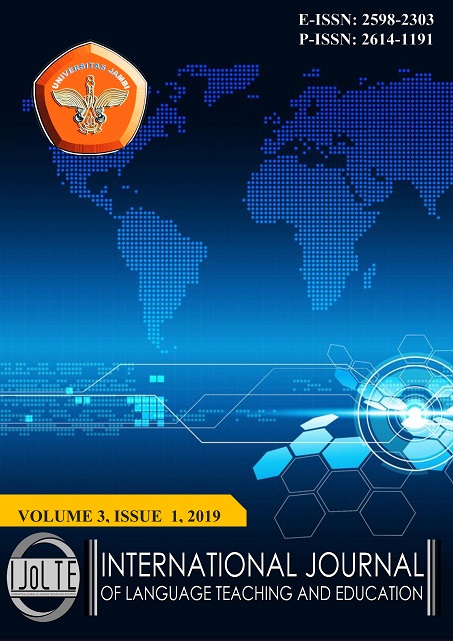Motivation and Instructional Preference of EFL Students at Tertiary Level
DOI:
https://doi.org/10.22437/ijolte.v3i1.6559Keywords:
EFL students, instructional preference, tertiary level, motivationAbstract
The aims of the study to find out the relationship between students’ motivation and instructional preference. The main components of motivation that underlay the students to learn English, and the students’ most preferred instruction, is beneficial to contribute to teachers’ understanding of the need to consider students’ preferences when planning the teaching-learning activities and to choose the instructional methods to use in teaching. A mixed-method design used in this study by combining quantitative and qualitative data to analyze. Descriptive statistics and interview analysis were used. The participants of this study were 323 students at a private university in Palembang, Indonesia. An 82-item questionnaire assessing motivation and instructional preference and semi-structured interview were used. The questionnaire consisted of 50 items measuring motivation and 32 items measuring instructional preference. The result showed that there was a positive and significant relationship between motivation and instructional preference. It means that students who had a higher level of motivation would have more instructional preferences than those who had a lower level of motivation. The result of the study indicated that the primary motivational components underlying the students to learn English were instrumental orientation, intrinsic orientation, and integrative orientation, and the students’ most preferred instruction was mastery learning. This study implies that teachers should be aware of diversifying the instructional methods used in their classes. They should take into account the students’ characteristics when planning and implementing educational processes.
Downloads
Downloads
Published
Versions
- 2019-07-25 (1)
- 2019-07-25 (1)
How to Cite
Issue
Section
License
The Authors submitting a manuscript do so on the understanding that if accepted for publication, copyright of the article shall be assigned to International Journal of Language Teaching and Education (IJoLTe) and Magister Program of English Education Department, Universitas Jambi as publisher of the journal. Copyright encompasses rights to reproduce and deliver the article in all form and media, including reprints, photographs, microfilms, and any other similar reproductions, as well as translations.
IJoLTe keep the rights to articles that have been published. And, the authors are permitted to disseminate published article by sharing the link of IJoLTe' website. Authors are allowed to use their works for any purposes deemed necessary without written permission from IJoLTe with an acknowledgement of initial publication in this journal.
IJoLTe and Magister Program of English Education Department, Universitas Jambi, and the Editors make every effort to ensure that no wrong or misleading data, opinions or statements be published in the journal. In any way, the contents of the articles and advertisements published in IJoLTe are the sole and responsibility of their respective authors and advertisers.
If the article was jointly prepared by more than one author, any authors who submitting the manuscript warrants that he/she has been authorized by all co-authors to be agreed on this copyright and license notice (agreement) on their behalf, and agrees to inform his/her co-authors of the terms of this policy. IJoLTe will not be held liable for anything that may arise due to the author(s) internal dispute. IJoLTe will only communicate with the corresponding author.
By submitting the article/manuscript to this journal, the authors agree with this policy and consciously agree that IJoLTe does not provide royalties or other fees to the authors for their published articles. By agreeing this policy, IJoLTe ensures that published articles are publicly accessible and will be free of charge for the readers. No specific document sign-off is required.
Users of this website will be licensed to use materials from this website following the Creative Commons Attribution 4.0 International License. Please use the materials accordingly
You are free to:
- Share — copy and redistribute the material in any medium or format
- Adapt — remix, transform, and build upon the material for any purpose, even commercially.
- The licensor cannot revoke these freedoms as long as you follow the license terms.





